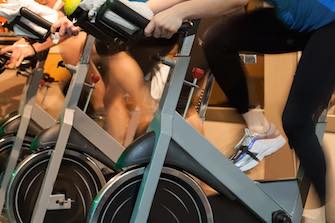 Have you ever gone spinning? I have. Actually, I love it. Schedule permitting, I spin a few times a week. Or at least I thought I was spinning. That was until last week when a client of mine, an online products distributor, sent an email that VeRO removed a “spin” bike they were selling on ebay.com. VeRO is ebay’s Verified Rights Owner program. VeRO allows a right’s owner (someone who has a verified trademark, copyright, etc.) to request removal of an item. This action, of course, is not without controversy. Business owners have claimed that this process is often abused and overreaching. I will leave that discussion for another day. For now, you should know that a company by the name of Mad Dogg Athletics, Inc. (MDA) is a member of the eBay VeRO Program and uses this program to enforce the nearly one hundred trademarks it owns, which include: spin, spinning, spinner, spin yoga, spinfitness, and spin daddy. With that said, only MDA’s Spin® bike can be called that, and so my client’s “spin bike” listing was removed due to use of the word spin.
Have you ever gone spinning? I have. Actually, I love it. Schedule permitting, I spin a few times a week. Or at least I thought I was spinning. That was until last week when a client of mine, an online products distributor, sent an email that VeRO removed a “spin” bike they were selling on ebay.com. VeRO is ebay’s Verified Rights Owner program. VeRO allows a right’s owner (someone who has a verified trademark, copyright, etc.) to request removal of an item. This action, of course, is not without controversy. Business owners have claimed that this process is often abused and overreaching. I will leave that discussion for another day. For now, you should know that a company by the name of Mad Dogg Athletics, Inc. (MDA) is a member of the eBay VeRO Program and uses this program to enforce the nearly one hundred trademarks it owns, which include: spin, spinning, spinner, spin yoga, spinfitness, and spin daddy. With that said, only MDA’s Spin® bike can be called that, and so my client’s “spin bike” listing was removed due to use of the word spin.
Pursuant to 15 U.S. Code § 1064(3), “… If the registered mark becomes the generic name for less than all of the goods or services for which it is registered, a petition to cancel the registration for only those goods or services may be filed. A registered mark shall not be deemed to be the generic name of goods or services solely because such mark is also used as a name of or to identify a unique product or service. The primary significance of the registered mark to the relevant public rather than purchaser motivation shall be the test for determining whether the registered mark has become the generic name of goods or services on or in connection with which it has been used.”
This is how Apple lost their trademark registration for the term “app.” Plenty of famous registrations were lost because they became generic: asprin, escalator, thermos, photoshop, dry ice, trampoline, and yes, even heroin. Google, however, recently won a battle against Plaintiffs who were claiming that the verb “to google” has become generic. In Elliot, et al. v. Google, Inc., No. 12-cv-1072 (PHX)(SMM) (D.Ariz., Sept. 10, 2014), the Court held that even though consumers use “google” as a verb to mean using any Internet search engine, GOOGLE® is a valid trademark because the “primary significance” of the mark to consumers is the use of Google.com.
That said, Google is one of the largest companies in the world. I know I am not a professional cycler by any stretch, but as someone who at least recreationally partakes in indoor cycling, I had never even heard of the MDA. I bet you if I polled the people at my class, most haven’t either. It’s also important mention that on its page for “indoor cycling,” Wikipedia states, “[i]t is commonly called spinning.” Yelp allows you to search for “spin” and “spinning studio.” ABC News refers to SoulCycle as a spin studio. For the record, they are not. I dare you to search any cycling studio’s reviews for the word “spin.” Almost every review I found seemed to use the word interchangeably.
For their part, MDA has taken every opportunity to enforce their marks. This is extremely important. They aggressively go after any and every infringer. They have sued Amazon and Walmart, and even went after a gym in Denmark. It’s CEO, John Baudhuin, has stated, “We spend almost a million dollars a year protecting our brand because it’s our responsibility to make sure everyone understands what our brand means.” They even have a specific landing page on their website dealing with use of their mark. In part, they explain, “the Spin®, Spinner®, Spinning®, Spin Fitness® and the Spinning logo ® trademarks are important business assets to Mad Dogg Athletics, Inc. and should be treated with the care and respect. We rely on our trademarks to identify our products, services, activities and programs to distinguish them from those of our competitors.”
But, is all of this enough? In 2000, the Southern District of New York held that the “Pilates” trademark was a generic term for a type of fitness method, similar to “yoga” or “karate.” The court ruled that “Pilates” was no longer capable of functioning as a source identifier. Since “consumers identify the word ‘Pilates’ as a particular method of exercise,” the Court found that the plaintiff could not monopolize it. The court acknowledged that everyone associated the term “Pilates” with the form of exercise in general rather than as an origin of services.
“Bikram Yoga” is currently involved in a similar dispute.
We will have to wait and see what happens there. But, I’m curious, what makes “spin” any different from “Pilates,” “yoga,” or “karate?”

![[IPWatchdog Logo]](https://ipwatchdog.com/wp-content/themes/IPWatchdog%20-%202023/assets/images/temp/logo-small@2x.png)

![[Advertisement]](https://ipwatchdog.com/wp-content/uploads/2024/04/Patent-Litigation-Masters-2024-sidebar-early-bird-ends-Apr-21-last-chance-700x500-1.jpg)

![[Advertisement]](https://ipwatchdog.com/wp-content/uploads/2021/12/WEBINAR-336-x-280-px.png)
![[Advertisement]](https://ipwatchdog.com/wp-content/uploads/2021/12/2021-Patent-Practice-on-Demand-recorded-Feb-2021-336-x-280.jpg)
![[Advertisement]](https://ipwatchdog.com/wp-content/uploads/2021/12/Ad-4-The-Invent-Patent-System™.png)







Join the Discussion
No comments yet.